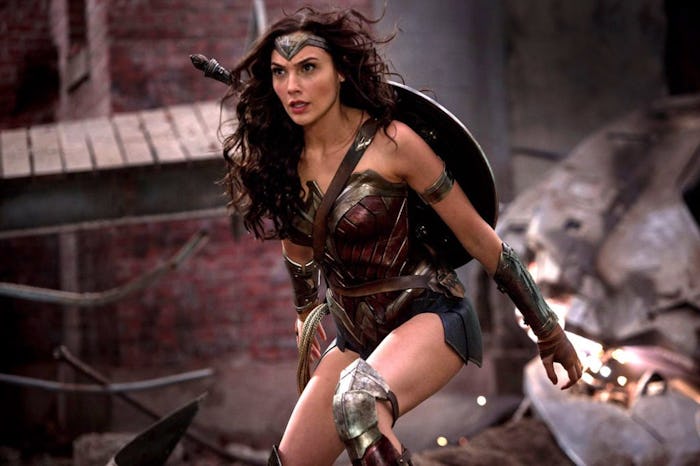Entertainment

The Real Lesson At The Heart Of 'Wonder Woman'
The much-anticipated Wonder Woman movie has been touted as a feminist superhero movie, in part because star Gal Gadot has been outspoken about the character’s feminist politics and in part due to the brouhaha surrounding an all-female Wonder Woman screening.. The movie has also resonated with viewers: the film pulled in more than $200 million on opening weekend, making it the biggest debut for a woman-led movie in Hollywood history.
Yet Wonder Woman is unique among superhero movies in more ways than one. Unlike many superheroes, whose identities are often shaped by either dead or absent family members and their pseudo-father figures (think the wealthy orphan Batman being raised by his butler Alfred), the most complex relationship in the film is between Wonder Woman (Gadot), a.k.a. Diana Prince, and another woman: her mother, Queen Hippolyta (Connie Nielsen), who is the driving force behind Diana’s origin story. The film is effectively a love letter to mother/daughter relationships, which sets Wonder Woman apart in a genre where heroes are often defined by their isolation from traditional family structures.
[Editor's note: This piece contains spoilers.]
In the film, Diana is raised on the island of Themyscira, an all-female society of Amazon warriors. Themyscira is ruled by Hippolyta, who believes that Diana is too naive and quick to believe the best in people, so she initially forbids Diana to train as an Amazon warrior. In an effort to protect Diana, Hippolyta tells her that she isn’t destined to become the greatest Amazon warrior among them, even though the lie is clearly written across the queen’s face.
Unbeknownst to Hippolyta, Diana trains in secret with her aunt, the fierce general Antiope (played by Robin Wright). When Antiope eventually confronts Hippolyta, the queen realizes it’s time to teach Diana how to fight and tells Antiope to train Diana harder than any Amazon before.
Hippolyta desperately wants to protect Diana, yet she is forced to acknowledge that it’s time to let her daughter out into the world alone.
Hippolyta desperately wants to protect Diana, yet she is forced to acknowledge that it’s time to let her daughter out into the world alone — a struggle that Nielsen says “every mother in the world will recognize.” “You love your child and you want to protect your child more than anything on this planet,” Nielsen told Cosmopolitan. “And yet by the time they’re 17, 18, they’re going to step into this world, and that world will not feel the same compunction, necessarily, toward your daughter.
Hippolyta is an imperfect yet loving mother. She grapples with questions about the best way to prepare Diana for the battles ahead. Will telling Diana the truth about the extent of her power tempt her to seek their nemesis Ares before she’s ready? Or should she let Diana discover the power within herself and break out of her mortal limits?
Traditionally, the relationship between Hippolyta and Wonder Woman has provided some of the franchise’s best plotlines, both in the comics and various Justice League cartoons. Yet the version of Hippolyta in the film is vastly different from her illustrated predecessors. Unlike the comic books, Hippolyta is not tricked into publicly crowning her daughter the champion of the Amazons during a tournament. Instead, she knows her daughter so well that she comes to intercept Diana sneaking away with spy and soon-to-be love interest Steve Trevor under the cover of night. Despite the fear clearly burning in the queen’s eyes, Hippolyta begrudgingly accepts Diana’s choice to leave the island and battle evil. She trusts Diana to choose her own path.
"I am Diana of Themyscira, daughter of Hippolyta,” Wonder Woman tells the villain during the film’s crowning battle scene, “and your wrath upon this world is over." Her duty is a continuation of her mother’s mission as the Queen of the Amazons.
Before Diana leaves, Hippolyta gives her one final warning: "Be careful in the world of men, Diana. They do not deserve you." It’s about as clear a feminist message as can be: to triumph in a man’s world, Diana has to rely on the skills her warrior mother and aunt taught her.
The relationship between Hippolyta and Diana is significant because it’s a marked departure from other superhero movies: for women in particular, their identities are often defined by male characters. (There would be no Supergirl without Superman, or Batgirl without Batman, and so on and so forth.) In contrast, Diana's most important connection is to her mother, and her primary identity is that of a daughter. She repeatedly identifies herself as such in her pinnacle moments of glory and peril. "I am Diana of Themyscira, daughter of Hippolyta,” Wonder Woman tells the villain during the film’s crowning battle scene, “and your wrath upon this world is over." Her duty is a continuation of her mother’s mission as the Queen of the Amazons.
The film’s treatment of the relationship between Hippolyta and Diana isn’t necessarily a departure from canon: the comic books and cartoons are full of Diana’s adventures with Hippolyta, and many comics even include Hippolyta as a member of the Justice Society of America. But the focus on the mother/daughter dynamic in the film makes the point that Wonder Woman isn’t just unique for her immortality, her kinky bondage motifs or her outspoken feminism. It’s her motivation.
The eternal love that anchors her life is the unique bond between a mother and daughter.
“You have been my greatest love,” Hippolyta tells Wonder Woman before the young warrior embarks on her journey.
Unlike other superheroes, Diana does not fight for the greater good of mankind. She fights for herself and the legacy her mother gave her. Love compels her, not guilt nor hubris. Diana’s lovers like Steve Trevor (and, it's hinted at the end of the film, Batman) can come and go, because the eternal love that anchors her life is the unique bond between a mother and daughter.